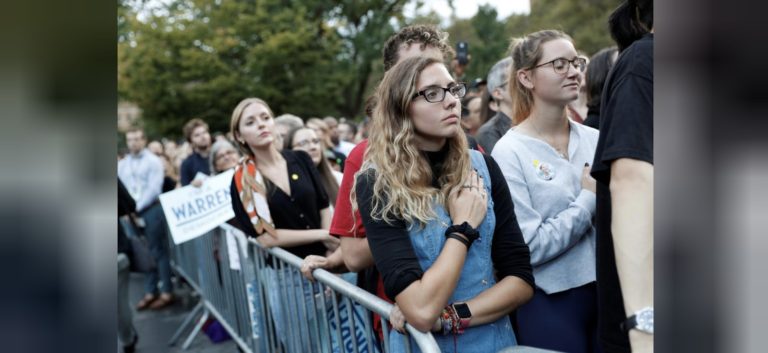On August 16, 2019, Senator Elizabeth Warren introduced her policy platform for tribal nations and indigenous peoples. At around 9,000 words, it was her longest policy proposal at the time, covering a wide range of plans, which includes: a permanent White House Council on Native American Affairs, physical and digital infrastructure investments, housing provisions, and criminal justice reform through an “Oliphant fix.” Even though some other presidential candidates recognize native communities’ grievances over the lack of adequate funding and resources, Warren’s proposal on criminal justice reform is one that distinguishes her from the rest of the Democratic field.
The proposed Oliphant fix refers to the 1978 Supreme Court case Oliphant v. Suquamish Indian Tribe in which the petitioner, Mark David Oliphant, was arrested and charged with assaulting a tribal officer and resisting arrest. Oliphant applied for a habeas corpus and argued that he could not be charged by the Suquamish Indian Provisional Court as a non-Indian. Subsequently, the Supreme Court agreed and ruled that Indian tribal courts do not have criminal jurisdiction over non-Indians unless authorized by Congress, highlighting that in a previous ruling on tribal jurisdiction, “such offender must be an Indian” and that “Indian tribes thereby come under the territorial sovereignty of the United States.”
As Warren has pointed out in her policy proposal, this ruling combined with limited resources effectively grants immunity to crimes committed on tribal lands and is often exploited. Studies have found that the rates of sexual assault and other violence against Native women on reservations far exceed those of other groups in the United States and that Native women are more likely to be assaulted by someone of non-Native descent.
In light of this alarming problem, the 2013 Violence Against Women Act recognized tribal governments’ criminal jurisdiction over non-Natives who commit domestic violence against Native Americans on tribal land, setting up Special Domestic Violence Criminal Jurisdiction (SDVCJ). Report conducted by the National Congress of American Indians (NCAI) five years after the act’s enactment suggests that this exception to Oliphant v. Suquamish has successfully brought some offenders to justice, but it is insufficient to fully address the issue of crime on tribal land. Over the span of five years, 143 SDVCJ-related arrests were made across the 18 implementing tribes, resulting in 74 convictions. The sentences ranged from probation to three years, in accordance with the Tribal Law and Order Act of 2010 which restricts the maximum sentence to three years’ imprisonment per offense. The report notes that since SDVCJ only applies to domestic violence by a spouse or a romantic partner, Native victims of assault committed by strangers or acquaintances are not protected. In addition, because of the limited scope of SDVCJ, tribes are unable to prosecute other serious crimes such as those involving violence against children or drugs.
Warren’s Oliphant fix intends to resolve these limitations by expanding tribal criminal jurisdiction “over all persons committing any crime in their Indian country.” In addition, she also pledges to amend the Indian Civil Rights Act in order to abolish the three-year sentencing limit for serious crimes. Warren maintains that tribes have the right to decide whether or not to accept this expansion in jurisdiction. Tribes that accept will receive funds for tribal courts and legal representation for victims through a Tribal Court Innovation Fund, which can be seen as a direct response to the prohibitively expensive SDVCJ as documented by the NCAI report.
In comparison, other major candidates with policy proposals on Native American issues have not demonstrated a willingness to reform criminal justice to such an extensive degree. Bernie Sanders advocates for the reauthorization of the Violence Against Women Act which expired in February 2019 and was later reauthorized by the House but blocked by the Senate. However, his platform does not specify whether he believes tribal jurisdiction should extend beyond the domestic violence exception to Oliphant and encompass all crimes on tribal land. In his policy proposal, Mike Bloomberg calls for the reauthorization of the Violence Against Women Act as well as the passage of Savanna’s Act which addresses missing and murdered Native Americans, but he remains unclear on the scope of tribal jurisdiction. If enacted in its entirety, Warren’s plan on criminal justice reform for Native Americans will have substantial implications for tribal jurisdiction. By affirming tribal courts’ jurisdiction to prosecute non-Native criminals for any crime to the extent they deem appropriate, this policy attempts to move away from the paternalistic role often undertaken by the United States judiciary vis-à-vis tribal nations towards one that is more equitable and respectful of tribal legal authority. It targets the root of the problem of rampant crimes on tribal lands and seeks accountability for criminals who abuse the system and long-awaited justice for their victims. With her fourth consecutive loss in the South Carolina primary, whether Warren’s vision will come to fruition remains to be determined.



